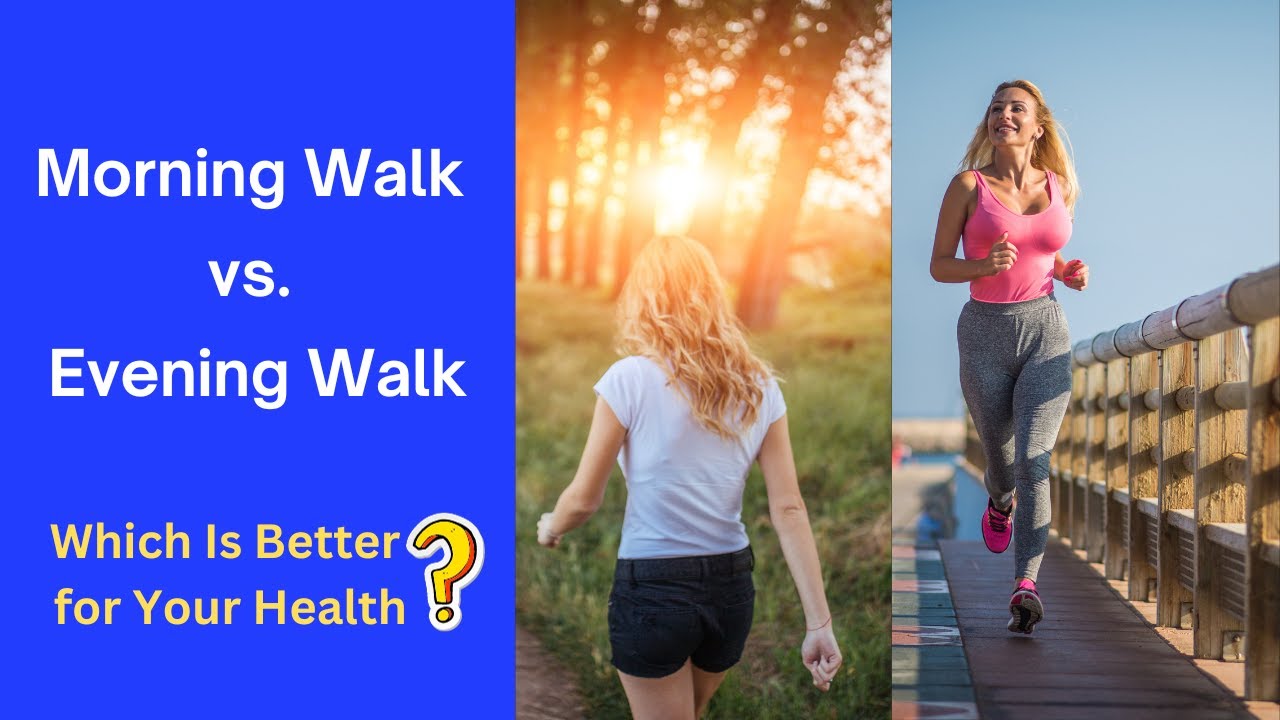
Here’s a detailed comparison blog on the benefits of Walking vs Running in the Morning or Evening, covering health benefits, timings, and suitability for different fitness levels:
Whether you’re trying to stay fit, lose weight, or just lead a healthy lifestyle, incorporating physical activity into your daily routine is essential. Walking and running are two of the simplest and most effective cardio exercises. But have you ever wondered – which is better for you? Should you walk or run? And should you do it in the morning or evening?
In this blog, we’ll break down the benefits of walking and running, the best time to do them, and help you decide what suits your body and goals best.
🌞 Morning vs 🌙 Evening: What’s the Ideal Time?
| Factor | Morning Walk/Run | Evening Walk/Run |
|---|---|---|
| 🌅 Pros | – Fresh air and oxygen-rich atmosphere – Boosts metabolism for the day – Enhances mental clarity and mood | – Muscles are warmer → lower injury risk – Helps destress and improve sleep – Performance may be better post meals |
| 🌅 Cons | – Stiff joints and muscles – May be hard to wake up early | – Polluted air in some areas – May be skipped due to fatigue/laziness |
🚶♂️ Benefits of Walking
Walking is a low-impact activity suitable for all age groups and fitness levels.
✅ Physical Benefits
- Burns calories (120-150 per 30 mins)
- Lowers blood pressure and cholesterol
- Strengthens heart and lungs
- Improves digestion and immunity
- Reduces risk of diabetes and stroke
✅ Mental Benefits
- Reduces anxiety and depression
- Improves focus and creativity
- Enhances mood via dopamine & serotonin release
✅ Best For
- Beginners
- Elderly people
- People with joint pain or injury
- Daily lifestyle management
🏃♂️ Benefits of Running
Running is a high-intensity activity ideal for those aiming for weight loss and cardiovascular endurance.
✅ Physical Benefits
- Burns more calories (250-350 per 30 mins)
- Builds stamina and cardio strength
- Helps in fast fat loss
- Improves bone density and muscle tone
- Boosts lung capacity
✅ Mental Benefits
- Enhances mental toughness
- Releases endorphins (runner’s high)
- Great stress reliever
✅ Best For
- Intermediate to advanced fitness levels
- People aiming for weight loss or athletic goals
- Those with no major joint issues
⚖️ Walking vs Running: Detailed Comparison
| Feature | Walking | Running |
|---|---|---|
| 🦵 Impact Level | Low (Joint-friendly) | High (May strain knees/ankles) |
| 🔥 Calories Burned | 120-150 in 30 mins | 250-350 in 30 mins |
| 🕒 Time Needed | More time for same calorie burn | Less time, faster weight loss |
| 👥 Who Can Do It | Anyone – safe and easy | Fit individuals or with guidance |
| ❤️ Heart Benefits | Excellent for heart health | Superior for cardio endurance |
| 💪 Muscle Work | Legs, glutes, light toning | Full lower body engagement |
🧠 Tips for Morning or Evening Walks/Runs
✔️ Morning Tips
- Hydrate before stepping out
- Warm-up is crucial due to stiff muscles
- Light snack like banana if needed
✔️ Evening Tips
- Avoid immediately after heavy meals
- Wear reflective gear if it’s dark
- Helps unwind after work/study stress
🧘♂️ What Should YOU Choose?
| Goal | Best Choice |
|---|---|
| Fat loss | Running |
| General fitness | Walking |
| Joint health | Walking |
| Mental well-being | Either (Walking preferred) |
| Time constraints | Running (less time, more output) |
| Beginner-friendly | Walking |
🔑 Final Verdict
- If you’re starting out or recovering from injury: Walking
- If you want quick results in weight loss or endurance: Running
- If you want a sustainable long-term habit: Walking in the morning or evening
- If you want to de-stress after a busy day: Evening walk or jog
💬 FAQs
❓Is it OK to walk after eating?
Yes, a light walk after meals improves digestion. Avoid running immediately after eating.
❓Can I combine both?
Absolutely! Many people walk on rest days and run on alternate days.
❓Is running bad for knees?
Only if you overdo it or have existing issues. Good shoes, soft ground, and warm-ups reduce risk.




